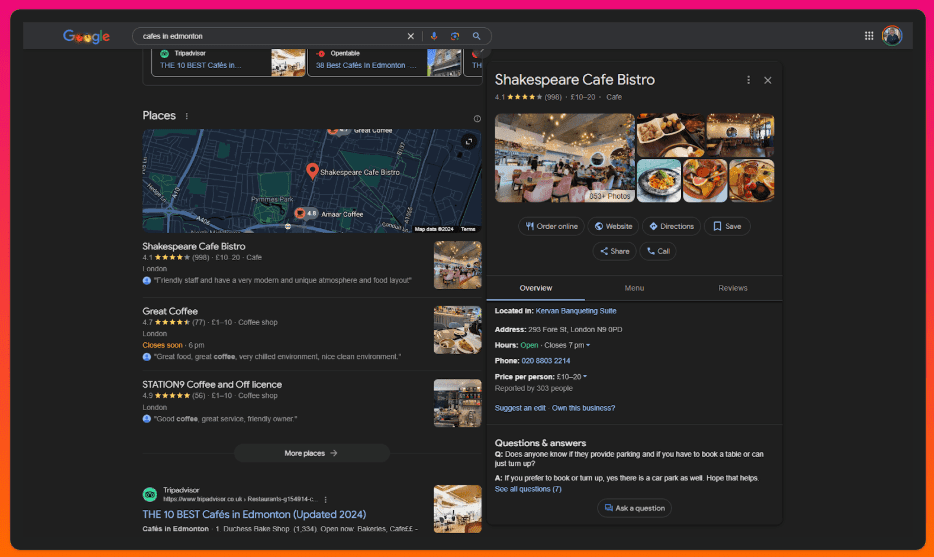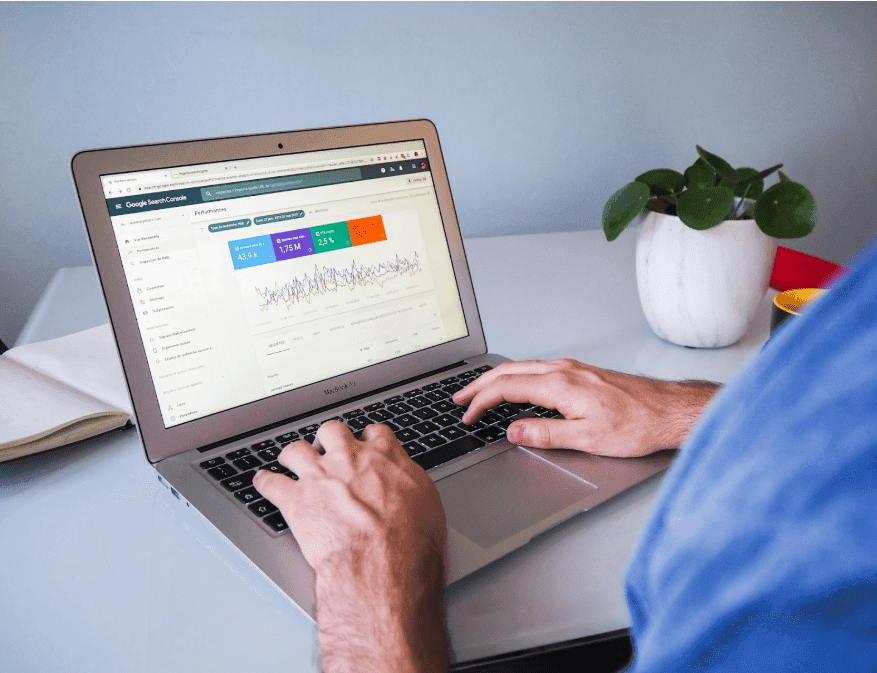Edmonton Local SEO: 7 Mistakes to Fix to Get Found Online
by Aaron Janes, Founder
If your a business owner, and you want to learn the same strategies that I use to grow my business and my clients, then sign up for my newsletter.

No doubt you've poured your heart and soul into your Edmonton business.
You've got a fantastic product, amazing service, and maybe even have a website that looks like a million bucks. But there's one problem... crickets.
You're not getting the traffic, the leads, or the customers you deserve.
If this sounds familiar, don't fret. The thing to remember is that even the best businesses in Edmonton can get lost in the digital shuffle if they're not showing up in local search results. Think about it – when was the last time you scrolled past page one of Google?
And there are only ten spaces, meaning competition is fierce.
While there are a ton of guides out there explaining what to do with your local SEO to get into that top ten and how to make your business perform better, these strategies only work if you implement them correctly and honestly.
With this in mind, today we're taking a look at the local SEO mistakes Edmonton businesses are making and how to fix them, giving you everything you need to climb back up the ranking where your business deserves to be.
Let's get into it.
Mistake #1: Your Google Business Profile is Gathering Dust (and Costing You Customers)

First things first, your Google Business Profile is the be-all and end-all of your ranking as a business. If your profile isn't set up for success, Google's absolutely not showing you in the top ten, thus people will go to your competitors that have taken the time to sort it out.
And when official Google statistics show that 70% of customers are more likely to visit your website if you have a complete profile, and 50% are more likely to buy, this is something you want to get right.
Here's the thing: an incomplete or inaccurate GBP is like having a storefront with a broken sign, a locked door, and cobwebs in the window. It's not exactly inviting. Instead, let's fix it up and get it right.
We're talking about things like:
Missing information: This is like forgetting to put your address on your storefront! Make sure your GBP includes all the essentials: your business name, address, phone number, website, hours of operation, and categories.
Wrong categories: Choosing the right categories helps Google understand what your business is all about and show it in relevant searches. Don't just pick the first one that looks close – take the time to find the most accurate categories for your business.
Outdated photos: Would you hang blurry, outdated photos in your shop window? Probably not! Showcase your business in the best possible light with high-quality, recent photos.
Inconsistent NAP (Name, Address, Phone number): This is a biggie! Make sure your NAP is consistent across your GBP, website, and all other online directories. Any inconsistencies can confuse Google and hurt your local rankings.
Pro Tip: Don't forget about Google Posts! This feature lets you share updates, offers, and events directly on your GBP. It's a fantastic way to engage with potential customers and keep your profile fresh.
Mistake #2: Your Online Reputation is... Crickets?

Reputation is everything these days, and Google looks for signs that you've got what it takes. While this can include getting backlinks from high-authority websites and growing your social media profiles, one, in particular, is simply getting reviews.
Think about it – when was the last time you booked a hotel or tried a new restaurant without checking the reviews first?
Even last week I needed to take my car to the garage and my previous one retired. Looking for a new one, I found myself not even considering any business that had under four stars.
In this same light, online reviews are like gold dust for local businesses. They build trust, credibility, and influence potential customers. In fact, a whopping 93% of consumers say online reviews impact their purchasing decisions. Again, not something you can afford to ignore.
So, how are your reviews?
Are you neglecting your online reviews? Maybe you have some there, but you're not responding to them, or they're old and outdated? Perhaps you're only focusing on one platform rather than Facebook, Yelp, Trustpilot, and the rest?
The takeaway here is to be active with your reviews. Set up content everywhere in your post-sales funnel that directs people to leave reviews on their preferred platforms. Respond to all reviews, both good and bad.
Even incentivize reviews if you have to. Many people check reviews and will decide whether or not to use your business based solely on them.
Beyond Reviews: The Importance of Citations
Citations are online mentions of your business that include your NAP (Name, Address, Phone number). Think of them as digital breadcrumbs that lead customers to your door. Consistent citations across the web are crucial for local SEO.
Here's the catch: even a small inconsistency in your NAP (like a wrong zip code or an outdated phone number) can confuse Google and hurt your rankings. Make it a habit to regularly check your citations and ensure they are accurate and consistent across all platforms.
Pro Tip: Claim your business listings on all major directories and review sites. This gives you control over your information and ensures accuracy.
By actively managing your online reviews and citations, you'll build a stellar online reputation that attracts new customers and sets you apart from the competition.
Mistake #3: Are You Speaking the Right SEO Language? (Hint: It's Local)

Keywords are a crucial part of SEO, also known as the art of putting specific phrases that people are searching on Google for into your content so Google knows what your website is about and shows your site to the right people.
So, if people search "best pizza near me" or "dog groomer in West Edmonton", your business shows up because those words are on your website.
Here's the thing: many Edmonton businesses make the mistake of focusing on generic keywords like "web design" or "marketing." While those are important, they're not enough to capture that valuable local traffic.
Think about it – someone searching for "web design" could be anywhere worldwide. But someone searching for "Edmonton web design" or "web designer in Sherwood Park"?
They're looking for you. Therefore, be specific with your long-tail keywords. The more specific you are, the closer to your ideal consumer you'll be.
Beyond "Edmonton": Digging Deeper
That said, to truly dominate local search, you need to go beyond just "Edmonton." Think about the specific neighbourhoods, districts, and areas your business serves.
Are you the go-to bakery in Whyte Ave? The best coffee shop in Strathcona? Use those location-specific keywords to your advantage.
Long-Tail Keywords: Get Specific
Long-tail keywords are longer, more specific phrases that target niche searches. For example, instead of just "restaurant," try "best patio restaurant in downtown Edmonton" or "romantic Italian restaurant in Old Strathcona."
These longer phrases often have less competition and attract highly qualified leads.
Unlocking Keyword Gold: Research Tools
If you're not sure where to start with keyword research, start with the basic tools to give you an overview of what keywords are out there and what sort of search volume they have.
Google Keyword Planner: A free tool that provides keyword ideas and search volume data.
SEMrush: A powerful paid tool that offers in-depth keyword research, competitor analysis, and more.
Ahrefs: Another popular paid tool with a comprehensive suite of SEO features.
Pro Tip: Don't just stuff keywords into your website content – use them naturally and strategically. Focus on creating valuable, informative content that addresses your customers' needs and search intent.
Mistake #4: Is Your Website Sending Google Mixed Signals?

Google doesn't actually know what your website is about. It's all bots and algorithms looking at the content of your website and analyzing it. If you have an H1 title tag that says "Best Cafe in Downtown Edmonton", then it knows that's what you're all about.
Making sure your website is structured and set up in the right way that Google knows what's going on is a process known as "on-page SEO" and I see mistakes in this all the time.
Things like having multiple H1 tags on a page (therefore communicating to Google that there are multiple topics of interest, without being able to decide on the best one). And then paragraphs and captions in H2, H3 and so on.
Remember, these tags highlight headers, and Google seeing paragraphs in this format, it'll ignore them and rank the page down.
We talk about on-page SEO a lot here on the Ignite Web Design blog, so check out some of the other guides on each topic, but here's a list to get you started:
Good, proper tag formatting
Correct titles and meta tags
All images are optimized, fast loading, and have good titles and alt text describing them
The URL is clear, concise, and informative
The website speed is fast (fast loading times)
Keywords are chosen carefully, optimized, relevant, and are used naturally with copy and blog content
There's a meta-description
On-page SEO in this way is like giving Google those clear directions to understand your website and its content. It's about optimizing the elements on your website to make it easy for search engines to crawl, index, and rank your pages.
Edmonton Flair: Localizing Your Content
Remember those local keywords we talked about? Sprinkle them throughout your website content! Mention Edmonton landmarks, neighbourhoods, and events to show Google (and your visitors) that you're a proud local business.
User Experience: The Key to Happy Visitors (and Google)
Google loves websites that provide a great user experience. Make sure your website is:
Mobile-friendly: More and more people are searching on their phones. A responsive website is a must.
Easy to navigate: Users should be able to find what they need quickly and easily.
Fast loading: No one likes a slow website. Optimize your images and code to speed things up.
Pro Tip: Use Google's PageSpeed Insights tool to analyze your website's performance and identify areas for improvement.
By nailing your on-page SEO, you'll be giving Google (and your visitors) a clear, welcoming path to your website.
Mistake #5: Is Your Website a Lonely Island? (Hint: It Shouldn't Be)

Link building practices are huge right now and have been for a few years.
This means other websites have links on their website that point to yours. It's like a nod to Google that says, hey, we're a website and giving credibility to this other website because we think what they have to say or do is legitimate and of quality to our users.
For example, if Forbes quotes and links to a statistic, since Forbes is a high authority website, the place where the statistic comes from is legitimate. This is based on the fact that Forbes has been around for years and is seen as a credible source of information.
So, you need to get people to link to your website, but only people who have legitimate credibility. It's better to have five high authority, high quality websites link to your website than it is to have 100 mediocre or poor quality websites linking to you.
So, how do you do that?
Building Local Connections: Link Building Strategies
Here's the thing: not all backlinks are created equal. Links from high-quality, relevant websites pack a much bigger punch. Here are a few strategies to build those valuable local links:
Partner with other Edmonton businesses: Team up with complementary businesses for cross-promotion. Maybe you're a coffee shop that can partner with a local bakery or a gym to collaborate with a health food store.
Get listed in local directories: Don't just stick to the big guys like Yelp and Google My Business. Explore niche directories specific to your industry or Edmonton.
Sponsor community events: Show your local love by sponsoring events or charities. This often comes with a link back to your website and some positive PR!
Pro Tip: Focus on building relationships, not just links. Engage with other local businesses online and offline, and provide value to your community. The links will follow naturally.
By building a strong network of local links, you'll boost your website's authority and visibility in Edmonton search results.
Mistake #6: Are You Flying Blind with Your SEO? (Not Using Analytics)

Imagine you're on a road trip from Edmonton to Banff. You wouldn't just set off without a map or GPS, would you? You'd want to know where you're going, how long it'll take, and if you're on the right track.
Tracking your SEO results is like having that map and GPS for your online journey. It helps you understand what's working, what's not, and where to focus your efforts.
Google Analytics and Search Console
These two free tools from Google are your best friends when it comes to tracking your SEO progress:
Google Analytics: This gives you insights into your website traffic – who's visiting, where they're coming from, and what they're doing on your site.
Google Search Console: This shows you how Google sees your website, including your keyword rankings, any crawl errors, and your website's performance in search results.
Metrics That Matter: Keeping an Eye on the Prize
Here are a few key metrics to track:
Website traffic: Is your organic traffic (from search engines) increasing?
Keyword rankings: Are you climbing the ranks for your target keywords?
Google Business Profile views: How many people are viewing your GBP?
Conversions: Are visitors taking desired actions on your website (like making a purchase or filling out a contact form)?
Pro Tip: Set up goals and conversions in Google Analytics to track specific actions on your website. This will give you valuable insights into what's driving results.
By regularly monitoring your SEO performance, you can make data-driven decisions, adjust your strategies, and ensure you're on the path to online success.
Mistake #7: SEO Isn't a One-Night Stand – It's a Long-Term Relationship
Let's be real; we all love those "set it and forget it" things in life, right? Like that slow cooker recipe that magically transforms ingredients into a delicious dinner while you're out conquering the world (or, you know, running your Edmonton business).
But here's the thing: SEO isn't a slow cooker. It's not something you can just set up once and then forget about.
Think of SEO as more like tending a garden. You need to consistently nurture it, weed out the bad stuff, and adapt to the changing seasons.
SEO is an Ongoing Process
The online world is constantly evolving. Google's algorithm changes, new competitors pop up, and user behaviour shifts. To stay ahead of the game, you need to be proactive with your SEO efforts.
This means:
Regularly updating your website content: Keep it fresh, relevant, and engaging.
Monitoring your keyword rankings: Track your progress and adjust your strategy as needed.
Building new links: Continuously seek out opportunities to strengthen your website's authority.
Feeling Overwhelmed? The Value of Professional SEO Help
If all this sounds like a lot to handle (and let's be honest, running a business is already a lot!), consider partnering with an experienced SEO professional. They can help you navigate the ever-changing world of SEO and ensure your website always performs at its best.
Pro Tip: Even if you do hire an SEO expert, it's still important to have a basic understanding of SEO principles. This will help you communicate effectively with your SEO team and make informed decisions about your online strategy.
By embracing the ongoing nature of SEO, you'll be setting your Edmonton business up for long-term online success.
Now, Over to You (Or Us?)
So there you have it, friends – 7 common local SEO mistakes that could hold your Edmonton business back from online domination.
Remember:
Your Google Business Profile is your online storefront. Keep it complete, accurate, and engaging.
Online reviews and citations are your digital word-of-mouth. Cultivate a stellar online reputation.
Local keywords are your secret weapon. Speak the language of your Edmonton customers.
On-page SEO is like giving Google a roadmap to your website. Make it easy for search engines to understand and rank your content.
Link building is all about building relationships and establishing authority. Connect with other local businesses and build a strong online network.
Tracking your results is essential for measuring your progress and making data-driven decisions. Use Google Analytics and Search Console to your advantage.
SEO is an ongoing process, not a one-time fix. Stay informed, adapt to changes, and consider partnering with an SEO expert.